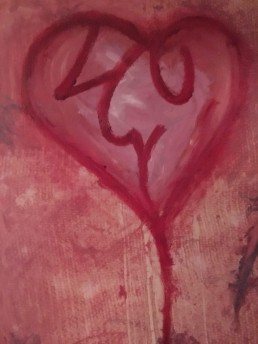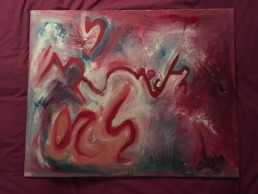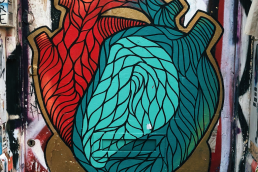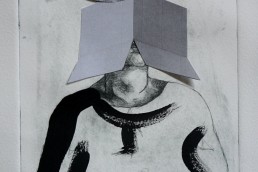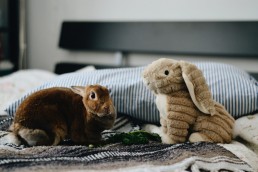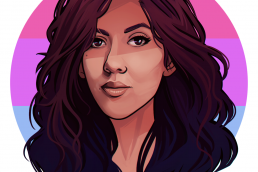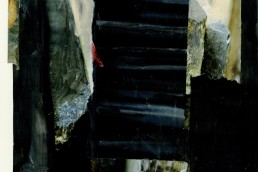Words and Art by Ana Hine
Sometimes, it can be patronising being told to “keep your chin up” when you’re in the middle of a challenging experience. In this story, Ana Hine gives an insight to the life of someone in the thick of feeling like they may be a failure.
She walked down to the gallery. Four hours of invigilating, and given £4 for lunch. So making about £1 an hour. She hated how much she was looking forward to it.
It had been half a decade since she graduated from art college, and she’d never sold a piece of visual art for more than £30. The flattering (or damning) newspaper reviews made little difference; people just didn’t want to invest in her feminist installation pieces.
She was nearly 30 and it felt like nothing had changed. She was still renting, couldn’t afford a car or an art studio. What had been the point of the First Class degree in conceptual art she’d worked so hard for all those years ago?
A few years back, she’d tried to do a Masters in fine art, but the long, irregular hours and the academic pressure had triggered a nervous breakdown. The force of it had caused such disruption and heartache that even now the stench of it still lingered in the burnt down bridges that used to connect her to her former lovers, classmates, and lecturers.
In theory she could return to her studies in a few months, but in reality she knew it wouldn’t make much difference. She’d still be here, in a cold gallery, being paid one pound an hour to keep an eye on other people’s art.
It’s not that she was resentful, she was just… disappointed in herself. Halfway through her Masters she’d felt really encouraged. Her abstract for a paper had been accepted for a conference, she’d had a solo exhibition and taken part in a group one where she’d sold some unframed prints, she was even in the process of organising a show at the local contemporary art gallery. And then it all went wrong.
Partly it had been the lower than expected grade, a B3 rather than the A she’d been expecting. She still remembered the anger and frustration when her tutor had explained her result. She’d demanded a second opinion, pissing off the head of her course in the process, and not actually improving her grade at all. She’d behaved like a brat – she saw that now – but it still stung.
And then, well she’d gone into overdrive. Stopped sleeping. She’d been convinced that by tapping into her unconscious she’d stumble across some artistic breakthrough, but she’d only succumbed to what the doctors later called ‘acute psychosis’.
It was never clear to her, in the psychiatric hospital admissions that followed, where the line between her creativity and insanity actually lay. She drew directly on the walls of her rooms, on the floors, clogged up a drain trying to extract the dye from coloured paper so she could print in the shower. In the better hospitals they gave her canvas and oil paints. In the worse ones they took away her bed and relegated her to a mattress on the floor, or banned her from the pottery class.
One day when a pair of circular knitting needles went missing and her room was searched she worked herself up into such a state she locked herself in the staff bathroom and lay down on the floor. She hadn’t stolen the needles, but she had owned similar ones in the past, and had she ever used them to make anything worthwhile? Was she even a good artist? Was she even an artist?
The question returned to her in the empty gallery. The other day she’d unpacked a canvas painted in hospital; an oil painting of phrases and words written in an almost unintelligible shorthand, with swirling pinks, creams, reds and purples. She’d submitted it to an exhibition call out. They were looking for pieces about mental health. What could be more relevant than a piece painted in the depths of psychosis – when it seemed like everything she did and said was met with the blank states of the vaguely concerned.
And yet, she couldn’t judge its quality. Invariably the feedback she received was that people “liked the colours”. She remembered another patient screaming at her in a fit of bipolar rage that she “couldn’t paint for toffee”. Maybe that was true.
In any case, she felt like a failure. As a human being and as an artist. She dreaded the letters from the Student Loans Company telling her how much she owed for her education. It didn’t help much knowing that most of the art graduates she knew were struggling to make ends meet. It just made it feel more like they’d all been duped.
Ana Hine
Ana Hine was shortlisted for the Scottish Mental Health Arts Festival 2018 Writing Awards for her poem ‘I Never Promised You A Rose Garden’, and often writes about mental health in her feminist arts zine Artificial Womb.
She is currently attempting to talk about her time in psychiatric hospital in her creative practice, and hopes to sell a piece of art for at least £100 in the next year. She has a diagnosis of Borderline Personality Disorder with suspected Bi-Polar, and works as a digital marketing assistant for an arts festival.

